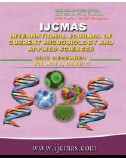


 National Academy of Agricultural Sciences (NAAS)
National Academy of Agricultural Sciences (NAAS)

|
PRINT ISSN : 2319-7692
Online ISSN : 2319-7706 Issues : 12 per year Publisher : Excellent Publishers Email : editorijcmas@gmail.com / submit@ijcmas.com Editor-in-chief: Dr.M.Prakash Index Copernicus ICV 2018: 95.39 NAAS RATING 2020: 5.38 |
Pigeon pea is one of the major kharif crop grown in district. Farm Science Center known as Krishi Vigyan Kendra laid down Front Line Demonstration in the year 2017-18 to 2018-19 introducing new and high yielding varieties and applying scientific practices in their cultivation. The FLDs were carried out in different villages of Batauli block of surguja district. Highest grain yield was obtained from obtained from Bataikela (11.65 q/ha) followed by Jarahadih (11.35 q/ha.), Nakna (10.50 q/ha), Boda (10.45 q/ha) and minimum average grain yield found in Maheshpur (10.40 q/ha). Hence, increased the yield 15.33 % after intervention of Krishi Vigyan Kendra Ambikapur. The variation in the yield was found due to the lack of knowledge, and poor socio economic condition. It is concluded that the FLDs programmes were effective in changing attitude, skill and knowledge of improved package and practices of HYV of pigeon pea adoption.
 |
 |
 |
 |
 |